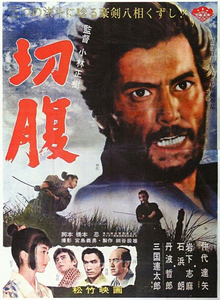 |
| Tatsuya Nakadai in The Human Condition II: Road to Eternity |
Kaji: Tatsuya Nakadai
Michiko: Michiyo Aratama
Shinjo: Kei Sato
Obara: Kunie Tanaka
Yoshida: Michiro Minami
Kageyama: Keiji Sada
Sasa Nitohei: Kokinji Katsura
Hino Jun'i: Jun Tatara
Director: Masaki Kobayashi
Screenplay: Zenzo Matsuyama, Masaki Kobayashi
Based on a novel by Junpei Gomikawa
Cinematography: Yoshio Miyajima
Art direction: Kazue Hirataka
Film editing: Keiichi Uraoka
Music: Chuji Kinoshita
If, as I said yesterday, the first part of Masaki Kobayashi's
The Human Condition makes me think of the earnest "serious pictures" that came out of Hollywood in the 1940s -- I have in mind such movies as
The Razor's Edge (Edmund Goulding, 1946), in which Tyrone Power searches for the meaning of life, or
Gentleman's Agreement (Elia Kazan, 1947), in which Gregory Peck crusades against antisemitism -- then the second part,
Road to Eternity, suggests, even in its subtitle, the influence of
From Here to Eternity (Fred Zinnemann, 1953), that near-scathing* look at brutality in Army basic training. Kaji, our idealistic protagonist, has been sent to war, and has to endure all manner of abuse even though he's an excellent marksman and a sturdy trooper. His objections to Japanese militarism and his belief that the war is wrong mark him out as a "Red," and for a time he contemplates escaping into his idealized version of the Soviet Union. But his sympathy for his fellow recruits keeps him plugging away, occasionally taking heat for his defense of them, especially from the military veterans who have been called up to serve. They object to his treating the recruits he is put in charge of training with respect and human decency -- they went through hell in basic training, so why shouldn't everyone? The film ends with a cataclysmic battle sequence, during which Kaji has to kill one of his fellow soldiers, who has gone stark raving mad and with his antics threatens the lives of other soldiers. It's not the first time Kaji has resorted to killing a fellow soldier: Earlier, he has been mired in quicksand with a brutal man who has caused the suicide of a recruit, and Kaji lets him drown. The intensity of the battle scenes takes some of the focus away from Kaji's intellectualizing, which is all to the good.
*I have to quality:
From Here to Eternity is not as scathing as the James Jones novel on which it's based, thanks to the Production Code and the residual good feeling of having won the war. In some ways,
The Human Condition II is more properly an anticipation of Stanley Kubrick's no-holds-barred
Full Metal Jacket (1987).




